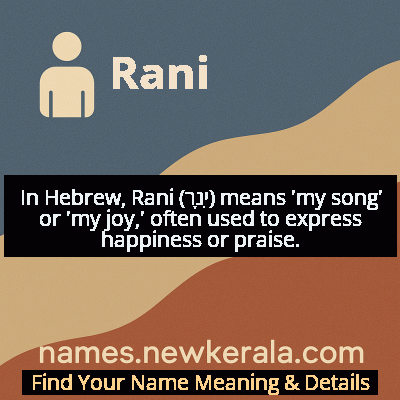Rani Name Meaning & Details
Origin, Popularity, Numerology Analysis & Name Meaning of Rani
Discover the origin, meaning, and cultural significance of the name RANI. Delve into its historical roots and explore the lasting impact it has had on communities and traditions.
Name
Rani
Gender
Male
Origin
Hebrew
Lucky Number
6
Meaning of the Name - Rani
In Hebrew, Rani (רָנִי) means 'my song' or 'my joy,' often used to express happiness or praise.
Rani - Complete Numerology Analysis
Your Numerology Number
Based on Pythagorean Numerology System
Ruling Planet
Venus
Positive Nature
Harmonious, responsible, caring, and artistic.
Negative Traits
Overly idealistic, superficial, possessive, or jealous.
Lucky Colours
Pink, turquoise.
Lucky Days
Friday.
Lucky Stones
Diamond, turquoise.
Harmony Numbers
2, 3, 9.
Best Suited Professions
Artists, musicians, teachers, healthcare workers.
What People Like About You
Warmth, nurturing nature, artistic flair.
Famous People Named Rani
Rani Berman
Composer and Music Therapist
Pioneered innovative music therapy techniques for children with special needs
Rani Birenboim
Military Commander
Distinguished Israel Defense Forces officer known for strategic leadership
Rani Boulos
Business Leader
Successful entrepreneur in Tel Aviv's technology innovation ecosystem
Rani Cohen
Academic Researcher
Leading researcher in Middle Eastern studies and cultural anthropology
Name Variations & International Equivalents
Click on blue names to explore their detailed meanings. Gray names with will be available soon.
Cultural & Historical Significance
Extended Personality Analysis
Men named Rani typically exhibit a harmonious blend of creativity and emotional intelligence that makes them both inspiring and approachable. Their name meaning 'my song' often manifests in their natural musicality—whether they become professional musicians or simply carry rhythm in their daily interactions. They tend to be excellent communicators who understand the power of words and tone, making them effective in fields requiring persuasion or teaching. Rani's are often the emotional centers of their social circles, able to sense group dynamics and mediate conflicts with their natural diplomacy. Their creative nature means they approach problems with innovative thinking rather than conventional solutions, often surprising others with their unique perspectives. While they possess strong social skills, they also value solitude for creative reflection and may have rich inner lives filled with artistic projects or intellectual pursuits. Their sensitivity, while sometimes making them vulnerable to emotional overwhelm, also grants them deep empathy and the ability to form genuine connections across cultural and social boundaries. This combination of artistic sensibility and emotional depth often leads them to careers where they can express their creativity while making meaningful contributions to their communities.
Modern Usage & Popularity
In the 21st century, Rani continues to be a meaningful choice for parents seeking a Hebrew name that balances tradition with contemporary appeal. While its usage remains primarily within Jewish communities, the name has gained some international recognition through cultural exchange and media representation. In Israel, the name maintains consistent but moderate popularity, often chosen by families with artistic backgrounds or those valuing the name's joyful connotations. Among diaspora communities, particularly in North America and Europe, Rani appeals to parents looking for authentically Jewish names that are distinctive without being difficult to pronounce. The name's musical meaning aligns with current naming trends that favor positive attributes and creative associations. Digital footprint analysis shows Rani appearing across social media platforms, often associated with individuals in creative industries, education, and community leadership. The name's enduring appeal lies in its ability to convey both cultural heritage and individual expression, making it a timeless choice that adapts well to modern global society while maintaining its deep Hebrew roots.
Symbolic & Spiritual Meanings
The symbolic resonance of Rani extends far beyond its literal meaning of 'my song,' representing the fundamental human need for self-expression and the transformative power of voice. In Jewish symbolism, song represents the soul's yearning for connection with the divine, making Rani a name that suggests spiritual seeking and emotional authenticity. The name embodies the concept that each person's life constitutes a unique melody in the symphony of existence, with its own rhythm, harmony, and emotional tone. Symbolically, Rani represents the idea that authentic self-expression—whether through art, relationships, or daily actions—creates meaning and connection in the world. The name also carries connotations of resilience, as songs often emerge from both celebration and sorrow, symbolizing the human capacity to create beauty from all experiences. In broader philosophical terms, Rani symbolizes the intersection of individual creativity and collective culture—the way personal expression both shapes and is shaped by cultural traditions. This rich symbolic tapestry makes Rani a name that speaks to the deepest aspects of human experience: our need to be heard, our capacity for joy, and our eternal search for meaning through creative expression.

